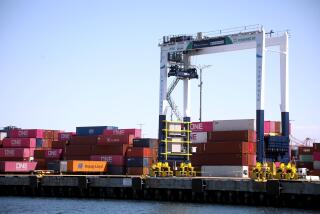GM Aims to Speed Development of Vehicles in 2nd Fuel Cell Alliance
WASHINGTON — In its second fuel cell agreement announced in as many days, General Motors Corp. said it is forming a strategic alliance with a Canadian firm to develop ways of storing and delivering hydrogen as fuel for automobiles.
The 25-year collaboration with Vancouver-based General Hydrogen Corp. will help speed up development of a hydrogen infrastructure and accelerate the introduction of fuel cell vehicles to global markets, said Larry Burns, GM’s vice president for research and development.
The alliance will concentrate on several areas including hydrogen storage, fuel cell vehicle refueling, advanced materials and electric power production. A prototype fuel cell vehicle should be possible in two to three years, Burns said.
Fuel cells convert hydrogen and oxygen into water and electricity, which is used to run electric motors. If pure hydrogen is used as fuel, water vapor and heat are the only by-products. If hydrocarbons such as gasoline or methanol are used, carbon monoxide and carbon dioxide are emitted, but at much lower levels than from conventional internal combustion engines.
“Electricity is one energy the developed world is hooked on,” General Hydrogen Chairman Geoffrey E.H. Ballard said. “Electricity has become an energy form that will dominate the future. Hydrogen and electricity will become seamless. A new word--’hydricity’--will enter our vocabulary.”
GM owns about 15% of General Hydrogen, but Burns would not give a dollar value of the stake.
GM believes that if fuel cell vehicles can be made affordable and commercially viable, there could be hundreds of thousands on the roads by 2010.
“To meet that goal the infrastructure needs to be in place,” Burns said. “It must be every bit as convenient . . . for our customers in terms of the experience of refueling their vehicles,” he said.
On Wednesday, shares of General Motors rose 14 cents to $59.53 on the New York Stock Exchange.
On Tuesday GM said it was taking a 20% stake in Quantum Technologies of Irvine, which is developing high-pressure hydrogen storage tanks to provide greater range for fuel cell vehicles.
DaimlerChrysler plans to put about 30 fuel cell-powered passenger buses in service in several European cities next year.
Ford Motor Co. says it will begin selling a fuel cell-powered version of its Focus compact car that runs on hydrogen in 2004, primarily to government and commercial fleets but possibly to retail consumers if an acceptable fueling system is developed.
More to Read
Inside the business of entertainment
The Wide Shot brings you news, analysis and insights on everything from streaming wars to production — and what it all means for the future.
You may occasionally receive promotional content from the Los Angeles Times.










